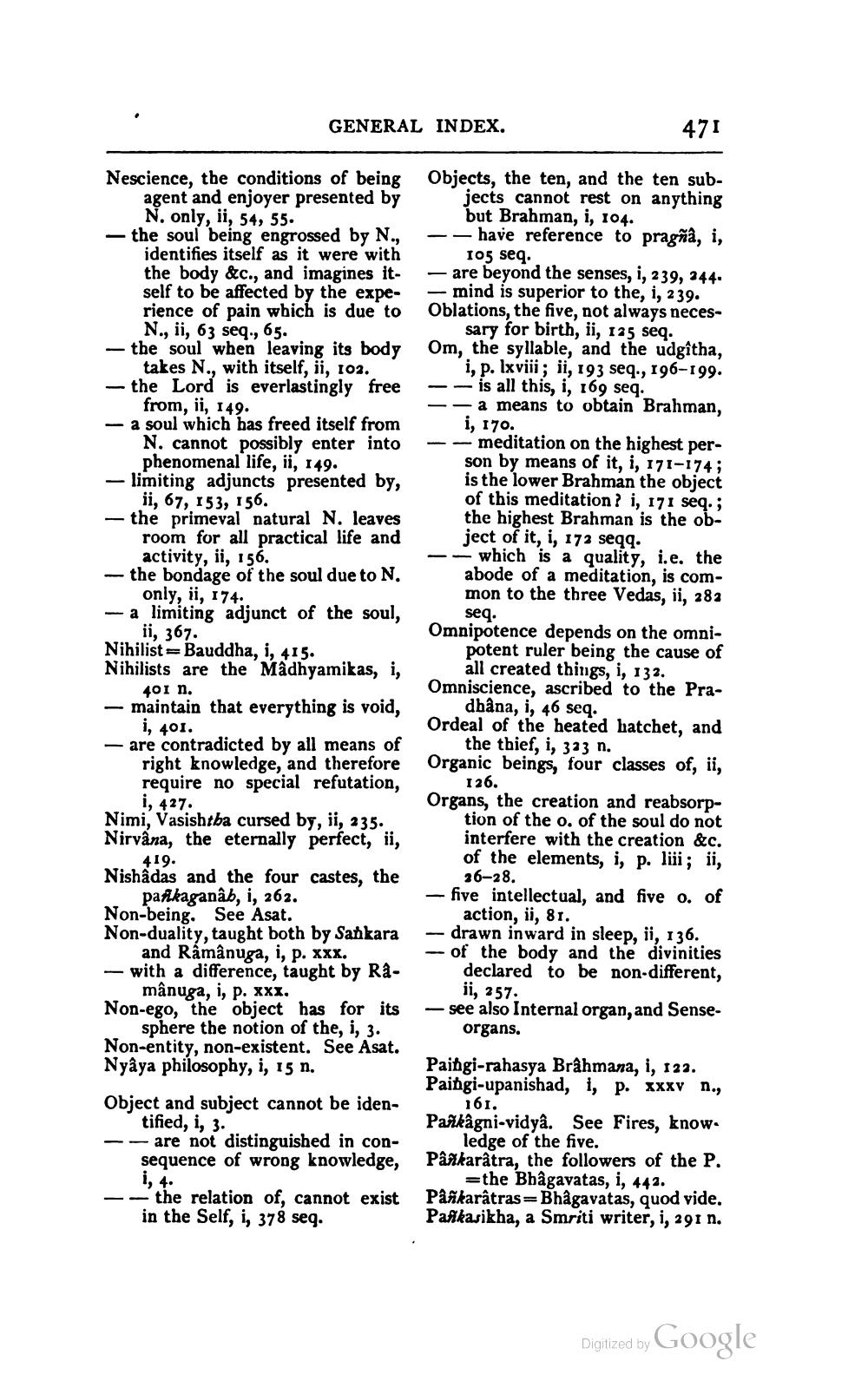________________
GENERAL INDEX.
Nescience, the conditions of being agent and enjoyer presented by N. only, ii, 54, 55. -the soul being engrossed by N., identifies itself as it were with the body &c., and imagines itself to be affected by the experience of pain which is due to N., ii, 63 seq., 65. -the soul when leaving its body takes N., with itself, ii, 102. -the Lord is everlastingly free from, ii, 149.
- a soul which has freed itself from N. cannot possibly enter into phenomenal life, ii, 149. -limiting adjuncts presented by, ii, 67, 153, 156.
the primeval natural N. leaves room for all practical life and activity, ii, 156. the bondage of the soul due to N. only, ii, 174. - a limiting adjunct of the soul, ii, 367.
Nihilist Bauddha, i, 415. Nihilists are the Madhyamikas, i,
401 n.
maintain that everything is void, i, 401.
- are contradicted by all means of right knowledge, and therefore require no special refutation, i, 427.
1
Nimi, Vasishtba cursed by, ii, 235. Nirvana, the eternally perfect, ii,
419.
Nishadas and the four castes, the pakaganâb, i, 262. Non-being. See Asat. Non-duality, taught both by Sankara and Râmânuga, i, p. xxx. - with a difference, taught by Râmânuga, i, p. xxx. Non-ego, the object has for its sphere the notion of the, i, 3. Non-entity, non-existent. See Asat. Nyâya philosophy, i, 15 n.
Object and subject cannot be identified, i, 3.
- are not distinguished in consequence of wrong knowledge, i, 4. -the relation of, cannot exist in the Self, i, 378 seq.
471
Objects, the ten, and the ten subjects cannot rest on anything but Brahman, i, 104. --have reference to pragñâ, i,
105 seq.
- are beyond the senses, i, 239, 244.
mind is superior to the, i, 239. Oblations, the five, not always neces
sary for birth, ii, 125 seq. Om, the syllable, and the udgîtha, i, p. lxviii; ii, 193 seq., 196-199. -is all this, i, 169 seq.
a means to obtain Brahman, i, 170. --meditation on the highest person by means of it, i, 171-174; is the lower Brahman the object of this meditation? i, 171 seq.; the highest Brahman is the object of it, i, 172 seqq.
which is a quality, i.e. the abode of a meditation, is common to the three Vedas, ii, 282 seq.
Omnipotence depends on the omnipotent ruler being the cause of all created things, i, 132. Omniscience, ascribed to the Pra
dhâna, i, 46 seq.
Ordeal of the heated hatchet, and the thief, i, 323 n. Organic beings, four classes of, ii,
126.
Organs, the creation and reabsorption of the o. of the soul do not interfere with the creation &c. of the elements, i, p. liii; ii, 26-28. -five intellectual, and five o. of action, ii, 81. -drawn inward in sleep, ii, 136. - of the body and the divinities declared to be non-different, ii, 257
- see also Internal organ, and Senseorgans.
Paingi-rahasya Brahmana, i, 122. Paingi-upanishad, i, p. xxxv n.,
161. Pažkâgni-vidyâ. See Fires, knowledge of the five.
Pânkarâtra, the followers of the P. =the Bhagavatas, i, 442. Pâñkarâtras Bhagavatas, quod vide. Pañkasikha, a Smriti writer, i, 291 n.
Digitized by
Google




